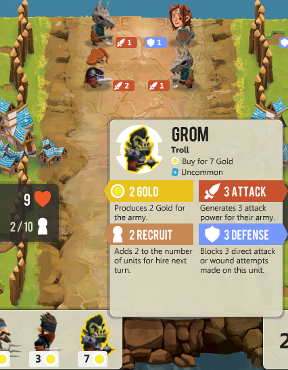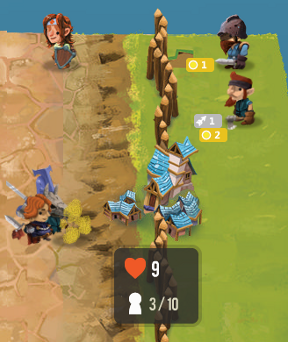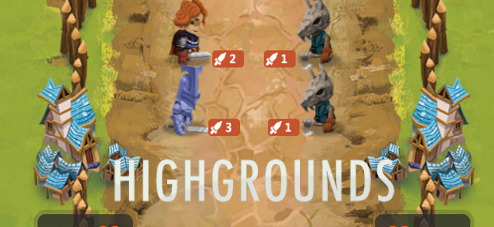![]() My great-grandfather, or at least the man I pretend was my great-grandfather when it's convenient or hilarious, was the great General George S. Patton, Jr. He was a man who knew his strategy, especially when that strategy involved advancing, attacking or conquering anything remotely resembling Axis territory. The Seventh and Third United States Armies wouldn't have been the same without him. Today I try to live up to his legacy by being the best video game strategist I can be. In Highgrounds, a turn-based defense/strategy game from Spry Fox and Heart Shaped Games, I embody Patton at his greatest by sending hordes of angry wolfmen and golems to do battle with ghosts, skeletons, bandits and other creatures that probably dislike America. Sure, I probably won't go down in history for my endeavors, but I get the feeling it's also a little bit safer than World War II.
My great-grandfather, or at least the man I pretend was my great-grandfather when it's convenient or hilarious, was the great General George S. Patton, Jr. He was a man who knew his strategy, especially when that strategy involved advancing, attacking or conquering anything remotely resembling Axis territory. The Seventh and Third United States Armies wouldn't have been the same without him. Today I try to live up to his legacy by being the best video game strategist I can be. In Highgrounds, a turn-based defense/strategy game from Spry Fox and Heart Shaped Games, I embody Patton at his greatest by sending hordes of angry wolfmen and golems to do battle with ghosts, skeletons, bandits and other creatures that probably dislike America. Sure, I probably won't go down in history for my endeavors, but I get the feeling it's also a little bit safer than World War II.
 Highgrounds is essentially a collectible card game rendered as a strategy game. You've got armies consisting of up to 28 units which you pit against other armies in an attempt to take down your opponent's city before they do the same to you. There are two things to keep your eye on... your gold, which is generated each round and used to buy more units, and your population, which determines how many units you can actually have. At the start of the round, you will be given a selection of various soldiers, and mousing over them will give you a rundown of their power and any special abilities. Just drag the one you want to the field to select it and click the crossed swords icon to start the round. The side with the most attack power, as tallied by the numbers next to the little swords above each unit's head, "wins" the round and deals damage to their opponent's base, and the first one to knock out all of the other's hit points wins.
Highgrounds is essentially a collectible card game rendered as a strategy game. You've got armies consisting of up to 28 units which you pit against other armies in an attempt to take down your opponent's city before they do the same to you. There are two things to keep your eye on... your gold, which is generated each round and used to buy more units, and your population, which determines how many units you can actually have. At the start of the round, you will be given a selection of various soldiers, and mousing over them will give you a rundown of their power and any special abilities. Just drag the one you want to the field to select it and click the crossed swords icon to start the round. The side with the most attack power, as tallied by the numbers next to the little swords above each unit's head, "wins" the round and deals damage to their opponent's base, and the first one to knock out all of the other's hit points wins.
Note that to save progress and actually challenge other players in matches, you need to register for a free account. Doing so will also allow you to edit your army, buy new units, and even change which city you use, which can impact your gold per round and other factors. If you feel like spending real money, that's the only way to get the Gems needed to buy "Booster Packs" of new units. You may find, however, that the units you earned through simply playing were able to hold their own against the computer opponents without much issue. Naturally, when it comes to other players you're dealing with both the units they have available to build armies and the strategies they employ, so your results may vary. In general, though, when you buy units you're paying for variety moreso than power. Building new armies that focus on different abilities is engrossing and the main reason to buy Gems is the chance to play around with more esoteric units, such as units that "generate" resources by taking them from the opponent or units that get stronger when combined with others. There's quite a few scenario battles where you fight against a computer opponent, but many players will find that the real game lies in battling other humans online. Options are available to create matches against random or specific players at your discretion.
 Analysis: The difficulty curve in the single-player game stays fairly constant. I didn't encounter any situations where I ran into a brick wall, though there were certainly matches I lost through poor strategy, bad luck or both. Again, when you're playing against humans it's difficult to say what the game's difficulty will be like. One high point of PvP matches is that Highgrounds takes full advantage of its turn-based nature and allows for asynchronous play like you might see in Words with Friends or similar games. You can make moves at your leisure and check back when you get the time to see if your opponent has done the same.
Analysis: The difficulty curve in the single-player game stays fairly constant. I didn't encounter any situations where I ran into a brick wall, though there were certainly matches I lost through poor strategy, bad luck or both. Again, when you're playing against humans it's difficult to say what the game's difficulty will be like. One high point of PvP matches is that Highgrounds takes full advantage of its turn-based nature and allows for asynchronous play like you might see in Words with Friends or similar games. You can make moves at your leisure and check back when you get the time to see if your opponent has done the same.
Highgrounds has a unique visual style that looks a bit like the claymation films of yesteryear. Most, though not all, units have unique appearances that make them easy to identify at a glance. Sound effects and animation are fairly simple, which makes it easy to keep track of what's going on during a match. Strategists and fans of collectible card games alike are bound to enjoy Highgrounds. Unlike many games that employ a similar model, microtransactions don't spoil the fun. Instead, players who try the game and like what they see have the option of paying for more without being forced to break out their wallets in order to enjoy themselves. It makes for a fantastic lunch break sort of game where you can play when you get time.







Walkthrough Guide
(Please allow page to fully load for spoiler tags to be functional.)
Highgrounds Tips and Tricks
The Basics
Your city choice affects the resources you get each turn, so you'll want to select it based on the style of units you favor. There are pure Gold and Crystal-based options, along with options that include both but lean toward Gold or Crystal respectively. The "hybrid" cities have a disadvantage in that they recruit fewer units per turn than a "pure" city, but they also don't produce any fewer resources than a pure city. If you like using both types of units at all, then a "hybrid" city won't hamstring you. If you're a "hybrid" fan, consider collecting Acolyte-type and Raider-type units which generate both Gold and Crystal from the back row.
Units are pretty varied, so it's difficult to point out particular choices that are better or worse than others. However, there are abilities that are easy to recommend. The Bolt ability, for instance, does damage based on the number of frontline units the enemy is fielding. This absolutely wrecks the AI opponent because of its tendency to amass a large number of low-attack frontline units; humans will usually shift their frontliners back to hamstring Bolt attacks. Rampage, which does more damage if you attack where the enemy doesn't have a matching frontline unit, is less powerful against the AI and more powerful against humans, who tend to prefer a lower number of high-powered units. Combining the two as a form of "pincer attack" against humans tends to be pretty effective.
It's worth noting that you need to focus on a mix of early, mid and endgame units so you're never without units to use. This is a concept known in physical TCGs as the "mana curve." Big scary units are, well, big and scary...but without plenty of early and midgame units to generate the resources needed to use them you're not going to get very far. Likewise, a deck comprised entirely of cheap early units is going to have trouble when the opponent's more balanced deck starts putting out bruisers and you're unable to match them thanks to the units-in-play limit. Don't put all your eggs in one basket. Plan for the game as a whole and you'll find that you're more effective.
Speaking of recruits: I found that four or five is a good, balanced level of recruiting. "Pure" cities start you off with four recruits and I didn't find it especially valuable to use dedicated recruiters to add more. If you find yourself constantly getting recruits that don't work for you, the problem is likely more in your deck than your recruiting abilities. Some recruiters also offer Gold or Crystal, though, so they're a better choice, but I believe that without a really nasty stroke of bad luck you shouldn't be getting too many bad recruit draws from a well-built deck.
Ability Tips
One class of ability that merits particular discussion is anything that wounds opponents. Wounded units are rendered useless and won't serve any of their funcitons. You need to account for this by including healing units in your army; your other option is to sell off wounded units and replace them. The one time you don't include healers is the same time your enemy's going to bring a horde of wounding units. At the same time, I recommend avoiding units that are only capable of healing. If you include too many dedicated healers, you may find that the enemy doesn't bring any wounding units or only uses them sparsely, leaving you with a bunch of dead weight clogging up your recruits. Selling wounded units isn't the end of the world and may be a better option if you don't have a good set of healers to choose from.
If you want to wound enemies yourself, the Fireball ability is the recommended way to do it. It targets both front and back row units, which is fantastic. What's more, the units with Fireball are usually Wizards in the back row, which means that units with Zealot can pump up off of them (since Zealot pumps up units when their owner uses Wizards in the back row). If you like the Acolyte units I mentioned earlier, you might want to try this strategy as those units are quite fond of Zealot.
Along the same lines, I found the Revenge ability to be pretty solid. It's good because there's two ways to use it: you can hope that your opponent brings lots of wounding units so your Revenge unit can pump up off of that...or you can use your own units with the Burnout ability (which causes units to wound themselves as they exceed a set level of performance) and intentionally burn them out to wound them, which will pump up your Revenge unit along with dealing plenty of damage off the attacks that trigger Burnout. Including a Revenge unit or two in your deck is never a bad choice, especially if you're fond of Burnout units.
Steal units are Literally The Worst and will make you tear your hair out until you figure out how to deal with them. A Steal 1 unit will nab the resources from the unit directly in front of it. If there's a unit in both the front and back that generates resources, it will only get the resources from the front unit. You need a way to deal with them or you will be locked down by armies that use Steal units instead of resource generators in the early game - a very popular strategy amongst players online in my experience. You end up with no resources to use for yourself while you fund their war machine, which is a bad place to be in. One option is to use cheap wounding units; another is to use your resource generators in pairs on the same row, so at least you'll get a few resources instead of none. If worse comes to worse, sell your resource gatherers! Don't give your opponent resources if you can help it! Steal units won't generate resources without an enemy unit to steal them from, so at the very least you can stop shooting yourself in the foot by giving away free money.
There's a few other abilities that are interesting but are a bit too specialized for general use. Generally these involve predicting what your opponent will do or what you'll get out of your recruit draws. Rampage can turn a medicore unit into a bruiser but relies on prediction to ensure you have more units than your enemy so your Rampager can attack a spot with no enemies in the front line. Combo abilities like Squire and Duo are similar in that they pump up average units, but in both cases you're going to have to hope that you get both parts of the combo from draws. If you're dead set on using combo abilities you might want to disregard the above advice about recruiting and pump it so you have the best possible chance to get both parts of a combo.
Gems!
Gems! They're truly outrageous. While Highgrounds isn't a "pay to win" game exactly and you get new units over time as you play, buying gems opens up more strategic options than you would have had otherwise. The best value for the money by far is the Crystal Starter, which offers a nice spread of units from the Crystal faction. Since other booster packs will inevitably give you Crystal units as a matter of course, it's nice to have a good base set available should you choose to use them. Otherwise, there's a good chance you'll end up with a few fancy Crystal units who don't have a baseline to actually be fielded in combat.
The Crystal faction units play fairly differently than the typical unit. They use the Crystal resource instead of gold, naturally, and they tend to encourage a more high-risk high-reward playstyle than the Gold-using set. A basic Crystal unit like Rainer, for instance, might cost 4 crystal where a Gold-using unit with similar attack might only cost 2 gold. At the same time, Rainer can team up with Raeus for increased attack power, and doing so makes both Rainer and Raeus more powerful than similar Gold-using units.
Less expensive boosters (and earning units for free over time by simply playing the game) tend to offer more common units, which tend to have less fancy abilities. This doesn't necessarily make them worse; in fact, I found that it's easier to form strategies with common units early on because you don't have to worry about advanced abilities like Rampage or Burnout. You can do a lot with a standard farm-and-fight deck, so don't feel like you're pushed into buying expensive boosters (or any boosters) if you don't want to or can't afford it.
More expensive boosters offer more chances at rare units. Unlike many games, though, rare units in Highgrounds aren't necessarily more powerful; rather, they're more specialized or unusual than common units. For example, Drake, the Crystal Skeleton Archer, can both heal and recruit in the back row and can wound back row units from the front row, both of which are moderately unusual abilities that aren't necessarily more powerful than just smacking dudes around. It's up to you if you want to take a chance with rare units, though again I'd suggest purchasing a Crystal starter set before doing so.
The Crystal Starter gives you 14 units, all of which are Crystal-based. The units you get are random, so if you're really into Crystal then it's not necessarily a waste to buy this multiple times. You'll also regularly get Crystal units from other booster packs, which is a pain if you don't start with at least one Crystal Starter as you won't have enough Crystal units to actually field any of them.
Posted by: corygalliher |
March 5, 2013 3:12 PM
|
March 5, 2013 3:12 PM